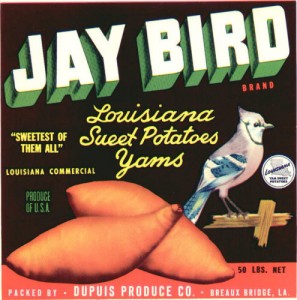Not in the Margaret Mead era any more: two New Guinea tribesmen are planning to sue The New Yorker over a Jared Diamond article. [New York Post, Forbes, Fran Smith]
Archive for April, 2009
Homeless man beat her after she offered cheeseburger
So a Tennessee woman is suing McDonald’s, saying it should have known its outlet was attracting a criminal element. She’s also suing a nearby liquor store and the attacker himself. [Nashville Tennessean]
“Witnesses feared being killed if they testified about the fraud”
Explosive testimony in a Los Angeles courtroom after a judge begins digging into indications of possible fraud in lawsuits by Nicaraguans against Dole Food alleging toxic harms from banana pesticides (L.A. Times via Cal Biz Lit, WSJ law blog; earlier at Overlawyered). The fraud went on for decades, a Dole lawyer charged, and included recruiting and coaching poor Nicaraguan men to pose as having been rendered sterile, even if they had children and had never worked on banana plantations. A California jury had awarded millions of dollars in one of a string of cases that drew controversy over the competence of stateside courts in evaluating claims over injuries that took place in foreign countries. According to the L.A. Times, one lawyer representing the plaintiff’s side in the litigation expressed regret over the actions of a co-counsel and said “all parties were in a nightmare situation.” Bloomberg:
Most of the employment records of Dole workers in Nicaragua were destroyed in the aftermath of the Sandinista revolution, opening the door to the fraudulent claims, Edelman said at the hearing.
Nicaraguan witnesses for Dole whose faces were hidden and whose voices were distorted to prevent identification, said in videotaped statements shown in court that they feared retribution if it became known they provided information to company investigators.
“They even would set fire to my house, even with my family in there,” one witness said. “These people don’t care.”
The cases of thousands more plaintiffs from poor banana-growing countries are waiting for trial in Los Angeles; Dow Chemical is also a defendant, because it manufactured the pesticide. [Update Apr. 24: judge tosses two consolidated lawsuits against Dole]
For another dramatic episode in which poor Latin American plaintiffs have surfaced in U.S. courts with hard-to-disprove claims, see the case of purportedly illegitimate Guatemalan children left fatherless by international air crashes (Nov. 29, 2000).
Just the excuse they needed
After the much-publicized (and remarkably quickly solved) murder, state attorneys general demand the regulation of Craigslist.
HR 875 and local food: is Rep. DeLauro backtracking?
[Third in a series on the possible effects of proposed federal food safety legislation on small/local foodmakers and farmers. Earlier coverage is here and here; and see related post on animal-tracking proposals]
- Could the outcry be having an effect? Until now, Rep. Rosa DeLauro (D-Ct.) has repeatedly insisted that backyard and kitchen-table producers have nothing to fear from her bill, H.R. 875, the proposed Food Safety Modernization Act, because they do not engage in “interstate commerce”.
 Many observers pointed out that under U.S. Supreme Court precedent, an exceedingly broad range of agricultural and food activity (right down to the growing of grain with which to feed oneself or one’s animals) has counted as within the bounds of “interstate commerce” reachable by federal regulation.* Now, at the end of a Huffington Post piece sympathetically relaying DeLauro’s views, there comes an “Update” nodding toward the courts’ practical application of the “interstate commerce” concept and reporting that DeLauro’s staff is promising “clarifications” of the bill’s reach, perhaps even “technical corrections”, to be ready “in the next few weeks”.
Many observers pointed out that under U.S. Supreme Court precedent, an exceedingly broad range of agricultural and food activity (right down to the growing of grain with which to feed oneself or one’s animals) has counted as within the bounds of “interstate commerce” reachable by federal regulation.* Now, at the end of a Huffington Post piece sympathetically relaying DeLauro’s views, there comes an “Update” nodding toward the courts’ practical application of the “interstate commerce” concept and reporting that DeLauro’s staff is promising “clarifications” of the bill’s reach, perhaps even “technical corrections”, to be ready “in the next few weeks”. - When those corrections and clarifications appear, one crucial question will be whether they include any de minimis provisions exempting small, local, or informal producers and sellers (of course, these entities might continue to face stringent state or local regulation). As it stands now FSMA, like CPSIA before it, is notable for its lack of de minimis exclusions, as well as its failure to prescribe “scale-appropriate” principles (“tiering”, streamlined reporting, etc.) by which entities that deal in less than industrial volumes might be given the benefit of simpler and less onerous rules.
- Given the stated views of the advocacy groups behind FSMA, I very much doubt that a revised version will in fact exempt producers of food intended for consumption within one state only. Even if it does, however, the law will still cover many persons like Harold Gundersen, who sells food from his Southwest Michigan farm at two suburban-Chicago farmer’s markets and in doing so manages to have legal contact with three states in all:
“We’re highly regulated by state government and federal government,” he said. … [Gundersen] pays $65 twice a year to an inspector from DuPage County, who comes up to Michigan to inspect the apple butter and cider that he sells.
Gundersen is indignant at that last requirement because he doesn’t even process the apple butter and apple cider — he takes his apples down to an Amish man in Indiana who seals them in cans and jugs. Because that facility is already visited by Indiana inspectors, Gundersen sees no reason for a DuPage inspector to take a second look.
“There is nothing for her to look at,” Gundersen said. “She looks at my jars and says, ‘OK, I’ll sign this stuff.'”
Through much of the country — in most of the big cities of the Northeast and Midwest, for example — food grown within a radius of (say) 100 miles will often have crossed state lines.
- FactCheck’s lullaby of reassurance on the subject contains the following passage aimed at readers who might be perceiving FSMA as a far-reaching power grab by the federal government, or something like that:
The bill has 41 cosponsors** and has been endorsed by major food and consumer safety organizations, including the Center for Science in the Public Interest, Consumer Federation of America, Consumers Union, Food & Water Watch, and The Pew Charitable Trusts. Food & Water Watch is a nonprofit organization that advocates for clean water and safe food and is headed by a woman who used to work for Public Citizen, the consumer group founded by Ralph Nader.
 Well! If a bill has 41 cosponsors, it must have been well vetted, right? (CPSIA had 106). And its backers include not only Consumers Union and Consumer Federation of America — both instrumental in bringing us the CPSIA debacle — but also a group headed by an alum of Nader-founded Public Citizen. It’s not as if Public Citizen was the acknowledged leader of the Washington coalition that pushed for CPSIA and has defended it ever since, right? Oh wait.
Well! If a bill has 41 cosponsors, it must have been well vetted, right? (CPSIA had 106). And its backers include not only Consumers Union and Consumer Federation of America — both instrumental in bringing us the CPSIA debacle — but also a group headed by an alum of Nader-founded Public Citizen. It’s not as if Public Citizen was the acknowledged leader of the Washington coalition that pushed for CPSIA and has defended it ever since, right? Oh wait.Center for Science in the Public Interest? That’s the outfit that’s called for federal regulation of the use of salt in foods, and its busybody litigiousness has long furnished copious material for this site. Pew Charitable Trusts (is it now OK for charitable foundations to support legislation?) has long had its hand in a hundred activist causes. And so forth. This is not reassurance; to coin a phrase, it’s de-assurance.
- Deputy Headmistress: “I would believe these consequences were ‘unintended’ if I didn’t see the same consequences from government action over and over again.”
- No, I don’t agree with the chain-email theories that insist that Monsanto, the giant agribusiness firm, is masterminding the push for this law. (Or the counter-push against it, depending on who you talk to. Maybe both!). Since the company’s name is always coming up, however, here’s a link to what the company’s own spokesman had to say on the lefty site Crooks and Liars, which was not quite what I expected (though I’m not sure what I did expect).
- Brian Doherty writes about the furor at Reason (with comments here) and John Schwenkler also weighs in at his blog. And in the comments section of our initial post, check out what “Pelly” has to say about yogurt in Nova Scotia.
*Of course, it’s possible that a statute might not grant the federal regulator as much authority as courts would be willing to uphold as constitutional. HR 875 incorporates by reference the FDA’s current definition of “interstate commerce”. I’m not an expert in this area, but various documents suggest that the FDA already asserts much authority over items and processes whose production or use does not cross state lines.
**Among the 41 co-sponsors are such figures as Rep. Jan Schakowsky (D-Ill.), who as a co-sponsor and defender of CPSIA has been ferociously unsympathetic to distress cries from small businesses arising from that law.
Annals of tasteful lawyer advertising
Mandatory employee breaks, cont’d
Evil HR Lady has more thoughts on the United Airlines incident, along with some kind words for this website.
“To say that I’ve never tried a case is false, and that’s what I object to”
Attorney Corey Trotz of Nahon, Saharovich and Trotz, known for his West Tennessee TV advertising, thinks he’s being criticized unfairly. [Hank Dudding, “Lawyers feud over trial experience”, Memphis Commercial Appeal, Apr. 21; Tom Freeland].
CPSIA chronicles, April 21

- Did you know that you can use the advanced search function at the SEC’s EDGAR database to track some of the losses in the business world from the Consumer Product Safety Improvement Act? (h/t Sunny Day Notes). Thus the Dollar General chain reveals in a 10-k filing that it took a charge of $8.6 million due to the sudden loss of value of merchandise early this year when a court reinstated CPSIA’s retroactive ban on phthalates in children’s playthings. Mark Riffey also suggests Google searches combining 10-K with CPSIA. (More on the countable costs).
- “A Quick Guide To What’s Wrong with the CPSIA” by leading reform activist Rick Woldenberg is more a jumping-off point for discussion than a finished bill of particulars — it doesn’t bring up the needless burdens of the law’s testing regime, for example. And it argues for more reasonable implementation without really taking issue on principle with the wisdom of the law. But it does have the advantage of being couched in the sort of Washington language a legislative staffer might be willing to take to colleagues.
- Speaking of quick guides, Carol Baicker-McKee has done up a two-page fact sheet on the need to fix CPSIA before it does more harm on the vintage-books front. Valerie Jacobsen polled both sellers and buyers in the homeschool market for used children’s literature and found that nearly all the buyers, and for the time being most of the sellers, were ignoring the CPSC guidelines that discourage most resale of pre-1985 volumes. Deputy Headmistress had a great post last month summing up reactions on the vintage-books front from David Niall Wilson, Amy Ridenour, Zodi @ Tim & Zodi, and less admirably, Consumer Reports/Consumers Union (which seems to be perfectly fine with the law’s effects). And did you know there’s a displayable sidebar widget of “CPSIA Endangered Books” based on the Flickr group with that theme?
- I am sorry to say I believe the story Jacobsen told at her site last month:
I just had an interesting conversation with Jared at the Senate Commerce Committee at 202-224-5115. Jared told me that the Commerce Committee had been unaware that pre-1985 children’s books (he knew about that restriction already) would still have commercial importance and ongoing value for children’s use. … Jared asked a lot of questions and twice expressed that it was new information “to the Committee” that these books still have any market importance.
The comments section to that post is a particularly good one for those interested in the fate of vintage children’s books or in the attitudes widely held on Capitol Hill; see also Deputy Headmistress.
- Not a good sign: the Obama/Biden campaign took a simplistic “ban ’em all” view on CPSIA issues in its document “Barack Obama: A Champion for Children” (PDF) And (h/t Mark Riffey) it was two and a half years ago that Rep. Henry Waxman and then-Sen. Obama reached for headlines by blasting the U.S. Capitol gift shops over its sale of trinkets and souvenirs containing lead — no need for careful distinctions about which such items if any might present actual, material hazards and which do not. (Dec. 11, 2006 announcement).
- Rain boots, buttons, Dr. Seuss: What passed and what didn’t when the owner of a Chicago-area resale store did x-ray fluorescence (XRF) testing to detect lead levels in many vintage kids’ products [From My Room]
- Pete Warden’s neat Mailana venture (among other functions) will analyze a group of Twitter connections to detect patterns. It indicates that of the 1,300+ persons now following @walterolson on that service, the two most distinctly identifiable social clusters are toymakers and lawyers. I feel torn sometimes between the North Pole and a hot place.
Public domain image courtesy ChildrensLibrary.org: Walter Crane, illustrator, The Baby’s Aesop (1887)
Advice: don’t accept friend requests from debt collectors
At least unless they really are your friends.
